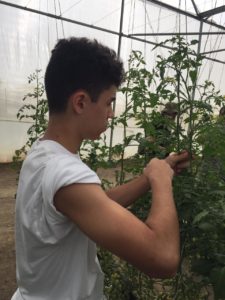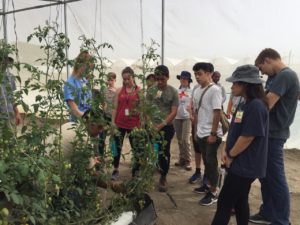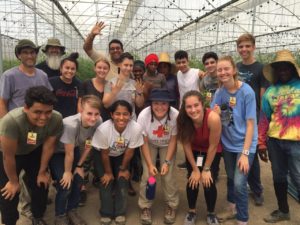Have you ever thought about where our food comes from? I didn’t. That was, until I got the opportunity to work on a tomato farm by the name of Maguana Tropical.
 This farm is one of the Dominican Republic’s biggest exporters, sending about 80% of all of their produce to places in the United States, while the rest (deemed unworthy of exportation) is sold in the DR. A question that one can think a lot about in the Dominican Republic is, “Whose story isn’t being told?” This question came up when we learned about the long and bumpy history of the DR, including the Native Americans who were massacred and how it was culturally accepted to look down on people of African heritage. The racism towards Africans was also seen when we learned about the cultural foundations of the DR. We had found out that although many Dominicans don’t like to admit it, African culture has found its way into every aspect of Dominican culture, from a religion known as Santeria to the dances that are practiced in every part of the DR such as the Merengue.
This farm is one of the Dominican Republic’s biggest exporters, sending about 80% of all of their produce to places in the United States, while the rest (deemed unworthy of exportation) is sold in the DR. A question that one can think a lot about in the Dominican Republic is, “Whose story isn’t being told?” This question came up when we learned about the long and bumpy history of the DR, including the Native Americans who were massacred and how it was culturally accepted to look down on people of African heritage. The racism towards Africans was also seen when we learned about the cultural foundations of the DR. We had found out that although many Dominicans don’t like to admit it, African culture has found its way into every aspect of Dominican culture, from a religion known as Santeria to the dances that are practiced in every part of the DR such as the Merengue.
How does this question apply to working at the farm? Well to begin, we were introduced to the president of the company, who was eager to show us his operation. We were taken into a nearby greenhouse where we began to understand the true merits that came with working on a tomato farm. Having walked into the warm and humid greenhouse we were introduced to the workers who would help teach us what they have been doing for months, and in one worker’s case, over three years. Although we only worked for a couple of hours, it quickly became apparent to us just how hard these seemingly simple jobs really are. These workers work from 7 am to 4 pm, breaking their backs in order to create something that we often fail to think more than once about. It is estimated that these workers get paid around 5000 pesos a month, which might seem like a lot until you find out that 5000 Dominican pesos is equal to only around 100 US dollars. Consider that many of these people have families to support. Think about what you can do with only $100.

I wanted to understand why these workers had ended up working in these below-ideal conditions, so I tried to figure out for myself. By talking to these workers I found out that I had misinterpreted the whole situation. These were people that were happy to even have a job, as most of them were from Haiti, a country in which getting a job is virtually impossible. So these workers are happy to spend time away from their family, in order to return with what many of us consider pocket change.
When we finished working, we presented the company’s president with a gift for allowing us to experience what it is like to truly work for something we in the US take for granted all the time. I learned that it is hard to put a price tag on the sheer amount of work that goes into our produce, and that we shouldn’t complain about prices because somewhere along the way someone else had held in their complaints about the heat and the pain in their backs because they were lucky to even have a job. It was after we had left that I realized that it wasn’t the president that deserved the gift, it was the people working under the sun that did. They were the ones that made this labor possible, and many of us fail to appreciate this. So please, whenever you are buying something, no matter what, stop and ask yourself, “Whose story isn’t being told?



